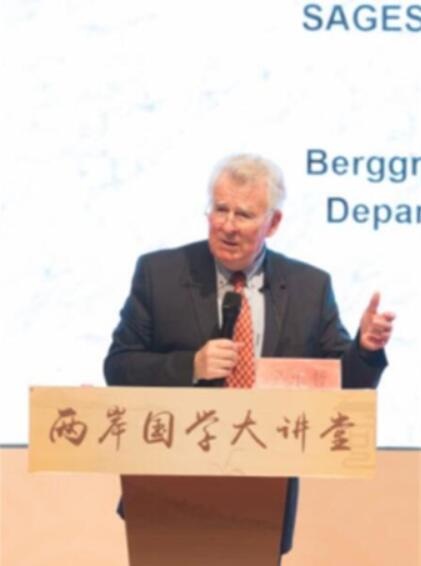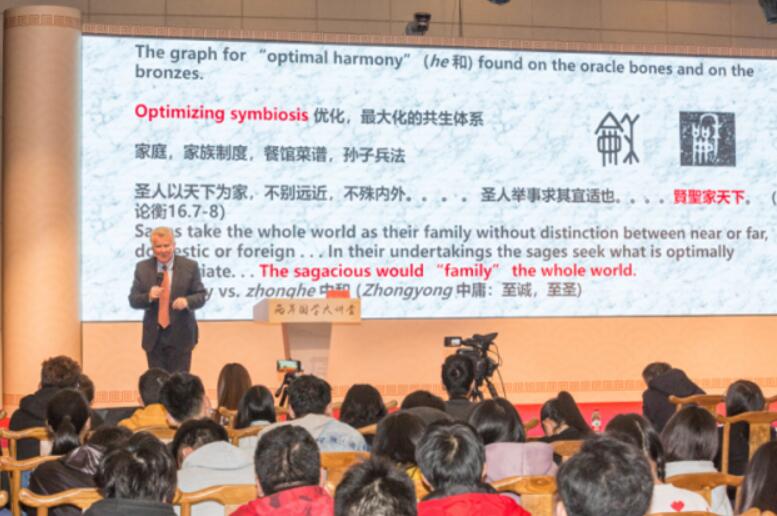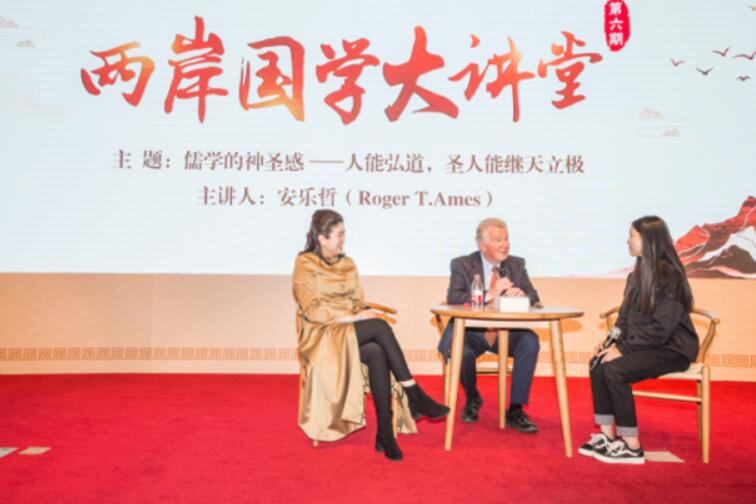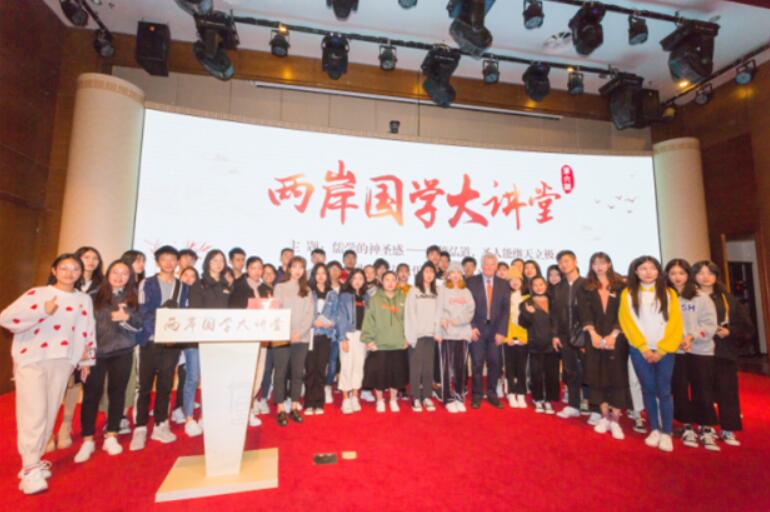Ames: Confucianism should play its due part in world integration
Pingtan Net | Updated:2018-12-06
The sixth Cross-Straits Guoxue Lecture given by Roger T. Ames, a noted sinologist [Photo/ptnet.cn]
The sixth Cross-Straits Guoxue Lecture, themed “Human beings broaden the way, but sagacious human beings can broaden tian”was given on the evening of Dec.5 in Pingtan Comprehensive Pilot Zone, Southeast China’s Fujian Province by Roger T. Ames, a noted sinologist.
Live streams on social media platforms such as Facebook, Sina, and Tencent were available, attracting 850,000 viewers online.
The event was jointly hosted by the Buddhist Research Center of Peking University and the Cross-Straits Guoxue Center headquartered in Pingtan.
Prof. Ames, dubbed “disseminator and elucidator of the Chinese culture” once pursued knowledge across three continents of Asia, Europe and America. He accepted an offer for an assistant professorship from the University of Hawaii in 1978, and he remained there until he retired in 2016. He is currently Humanities Chair Professor at Peking University in Beijing, China and Berggruen Institute Fellow in Los Angeles, the USA.

The sixth Cross-Straits Guoxue Lecture given by Roger T. Ames, a noted sinologist [Photo/ptnet.cn]
“It was the best of times, it was the worst of times.” Prof. Ames quoted an excerpt from A Tale of Two Cities as his opening remarks. He said that hunger is no longer a critical problem nowadays. Yet humans are still not wise enough to solve problems such as global warming, income disparities and energy shortage.The Western cultures cannot solve these problems single-handed. Confucianism could help.
“When Christian missionaries- first Jesuit Matteo Ricci, Protestant James Legge and then down to the present day- are introducing Chinese culture into the Western academy, they have been motivated to close the distance between these traditions by interpreting the Chinese world through a heavily Christianized language,” said Ames.
The vocabulary established largely by Christian missionaries for the translation of classical Chinese texts into Western languages has been freighted by a patently Christian framework, and kept the effects of “Christianization” of Chinese texts. Take “天”in Chinese for instance, it has been translated into “Heaven” in the West. According to Ames, this is inaccurate and somewhat different from the “Tian” which Confucius was referring.
When Chinese philosophers speak of the world, they are thinking of the world that we are living in. There is no world beyond or outside of the one we are experiencing. They are not referencing “a world” or “the world,” but are simply saying “world,” where the fact that “world as such” does not have an article in front of it is really significant.
Prof. Ames claimed that “tianren heyi 天人合一” describes the inseparability of the relationship between the numinous and the human experience. Tian天 certainly provides human beings with a context for flourishing, and serves us as a model to emulate and revere. But since the relationship between tian and human beings is irreducibly collateral, we have to ask: What through personal cultivation can be made of this tianren relationship?
Ames suggested that not only can “human beings broaden the way,” (ren neng hongdao 人能弘道), but “sagacious human beings can broaden tian” (shengren neng jitianliji 圣人能继天立极).
Prof. Ames encouraged the audience to get exposed to the fine traditional Chinese culture and pass it on to the next generations.

The question-and-answer session [Photo/ptnet.cn]
In the question-and-answer session, Fang Jin’e, a student from Pingtan Campus of Fujian Polytechnic of Information Technology, asked about Ames’s opinions on DINK (Double Income No Kids) families as the professor emphasized the importance of “filial piety” in Confucian culture in his speech and a Chinese saying goes “There are three unfilial conducts, of which the worst is to have no descendants to succeed the family name and honor.”
Ames answered that Confucianism is a progressive tradition, and every era has its own problems. Confucianism is a broad thought which accepts and evolves along with time hence it will not subjugate modern society with past societal norms. Therefore, he believed that it is up to individuals to live what they expect.

Prof. Ames taking a photo with the audience after his speech [Photo/ptnet.cn]
Lin Hewu, a teacher from the Affiliated High School of Fujian Normal University in Pingtan, led a group of over 20 students to the lecture. He said the lecture is of great help for the students in exploring the Confucianism and enhancing their interests in learning, and he himself has rediscovered the charismatic Confucianism from the perspective of Ames as a foreign scholar.
The Cross-Straits Guoxue Lecture, an activity taking place on a regular basis in the Cross-Straits Guoxue Center of Pingtan, strives to be made a distinctive cultural brand across the Taiwan Straits. Linking the shared culture across the Straits, the center is aimed at disseminating the Chinese culture by either inviting famous scholars from both sides of the Taiwan Straits, or adopting a live stream for a lecture outside Pingtan.

 Fujian Public Security Registration Code: 35012802000271
Fujian Public Security Registration Code: 35012802000271